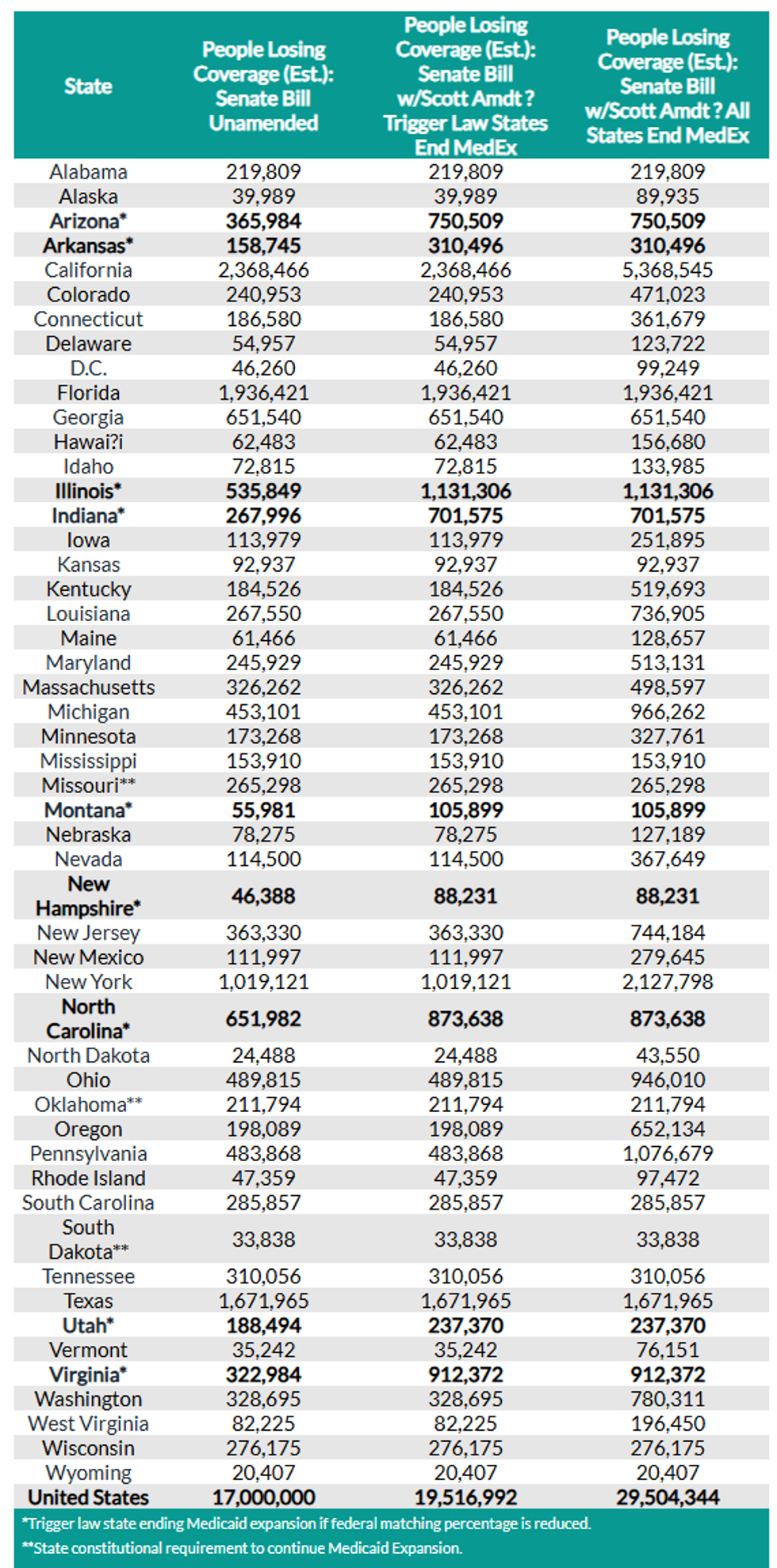According to a preliminary estimate by the Democrats on the Joint Congressional Economic Committee, that number could balloon up to anywhere from 20 to 29 million if Scott's (R-Fla.) amendment passes.
The amendment will be voted on as part of the Senate's vote-a-rama, which is expected to run deep into Monday night and possibly into Tuesday morning.
"If Sen. Rick Scott's amendment gets put forward, this would be a self-inflicted healthcare crisis," said Tahra Hoops, director of economic analysis at Chamber of Progress.
The existing GOP reconciliation package contains onerous new restrictions, including new work requirements and administrative hurdles, that will make it harder for poor recipients to claim Medicaid benefits.
Scott's amendment targets funding for the program by ending the federal government's 90% cost sharing for recipients who join Medicaid after 2030. Those who enroll after that date would have their medical care reimbursed by the federal government at a lower rate of 50%.
The Affordable Care Act (ACA) introduced the increased rate in 2010 to incentivize states to expand Medicaid, allowing more people to be covered.
Scott has said his program would "grandfather" in those who had already been receiving the 90% reimbursement rate.
However, Medicaid is run through the states, which will have to spend more money to keep covering those who need the program after 2030.
The Center on Budget and Policy Priorities estimated that this provision "would shift an additional $93 billion in federal Medicaid funding to states from 2031 through 2034 on top of the cuts already in the Senate bill."
This will almost certainly result in states having to cut back, by introducing their stricter requirements or paperwork hurdles.
Additionally, nine states have "trigger laws" that are set to end the program immediately if the federal matching rate is reduced: Arizona, Arkansas, Illinois, Indiana, Montana, New Hampshire, North Carolina, Utah, and Virginia.
The Joint Congressional Economic Committee estimated Tuesday that around 2.5 million more people will lose their insurance as a result of those cuts.
If all the states with statutory Medicaid expansion ended it as a result of Scott's cuts, as many as 12.5 million could lose their insurance. Combined with the rest of the bill, that's potentially 29 million people losing health insurance coverage, the committee said.
 A chart shows how many people are estimated to lose healthcare coverage with each possible version of the GOP bill.(Chart: Congressional Joint Economic Committee Democrats)
A chart shows how many people are estimated to lose healthcare coverage with each possible version of the GOP bill.(Chart: Congressional Joint Economic Committee Democrats)
There are enough Republicans in the Senate to pass the bill with Scott's amendment. However, they can afford no more than three defections. According to Politico, Sens. Rand Paul (R-Ky.) and Thom Tillis (R-N.C.) have signaled they will vote against the amendment.
Sen. Jim Justice (R-W.V.) also said he'd "have a hard time" voting yes on the bill if Scott's amendment passed. His state of West Virginia has the second-highest rate of people using federal medical assistance of any state in the country, behind only Mississippi.
Critics have called out Scott for lying to justify this line of cuts. In a recent Fox News appearance, Scott claimed that his new restrictions were necessary to stop Democrats who want to "give illegal aliens Medicaid benefits," even though they are not eligible for the program.
Scott's proposal has also brought renewed scrutiny to his past as a healthcare executive.
"Ironically enough, some of the claims against Scott's old hospital company revolved around exploiting Medicaid, and billing for services that patients didn't need," wrote Andrew Perez in Rolling Stone Monday.
In 2000, Scott's hospital company, HCA, was forced to pay $840 million in fines, penalties, and damages to resolve claims of unlawful billing practices in what was called the "largest government fraud settlement ever." Among the charges were that during Scott's tenure, the company overbilled Medicare and Medicaid by pretending patients were sicker than they actually were.
The company entered an additional settlement in 2003, paying out another $631 million to compensate for the money stolen from these and other government programs.
Scott himself was never criminally charged, but resigned in 1997 as the Department of Justice began to probe his company's activities. Despite the scandal, Scott not only became a U.S. senator, but is the wealthiest man in Congress, with a net worth of more than half a billion dollars.
The irony of this was not lost on Perez, who wrote: "A few decades later, Scott is now trying to extract a huge amount of money from state Medicaid funds to help finance Trump's latest round of tax cuts for the rich."




 A chart shows how many people are estimated to lose healthcare coverage with each possible version of the GOP bill.(Chart: Congressional Joint Economic Committee Democrats)
A chart shows how many people are estimated to lose healthcare coverage with each possible version of the GOP bill.(Chart: Congressional Joint Economic Committee Democrats)